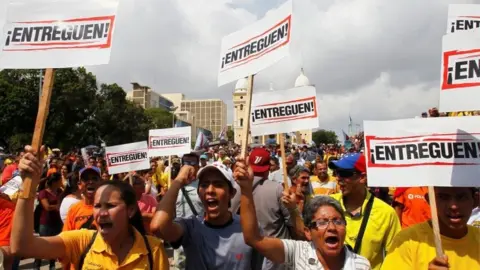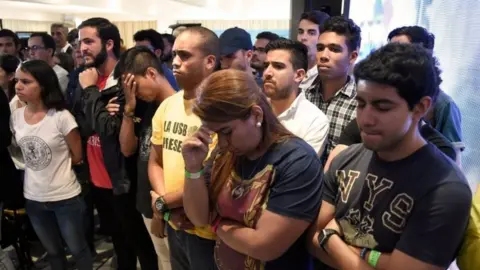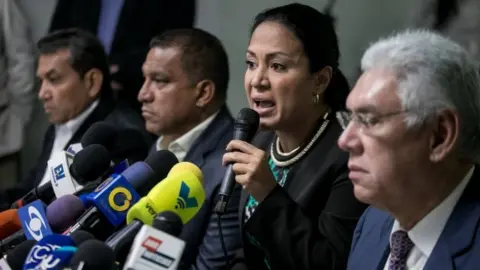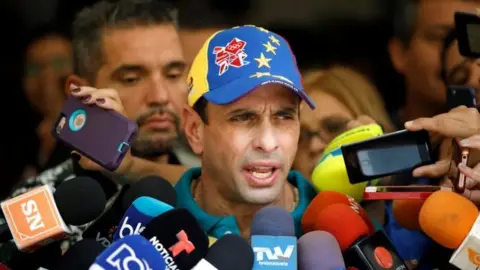Venezuela's divided opposition faces tough choices
 Reuters
ReutersIt seems Venezuela's opposition has run out of options.
In the regional elections earlier this month, opposition candidates won in only five out of 23 states, even though pre-election polls had predicted that the majority of states would go to them.
Mr Maduro's approval ratings may only be a little over 20% and he is leading a country mired in a deep economic crisis where people struggle to get food and medicines, but the president is riding on a high.
Daily anti-government protests backed by the opposition earlier this year had no discernible impact on the Maduro administration.
Despite criticism at home and abroad, the president pressed on with his plan for a constituent assembly, which his critics denounced as a way to maximise his power.
Poll defeat
Then came the regional elections on 15 October.
 AFP
AFPDespite their distrust of the electoral authorities, which they accuse of pro-government bias, the Democratic Unity Roundtable (MUD) opposition coalition decided to take part in the polls.
The argument was that it would be the best way to keep up the pressure on President Maduro and to show how little support he has.
But taking part in the election was not a universally popular decision, with some opposition supporters arguing it was naive to assume the government and the electoral authorities would play fair.
The opposition's crushing defeat seems to have proved the sceptics right.
Millions of disillusioned Venezuelans now looked to opposition leaders for answers about what would happen next.
Deep divisions
But in the aftermath of the election, there was neither clear leadership nor consensus and cracks within the coalition did not take long to open up.
The coalition had stated that none of its candidates would agree to be sworn in by the constituent assembly, the body created by President Maduro which has assumed many of the powers of the opposition-controlled legislative assembly.
But last week, four out of the five opposition governors-elect went against the coalition's decision and swore their oath in front of the constituent assembly's president.
 EPA
EPAAll four are members of Democratic Action and the party's leader, Henry Ramos Allup, was heavily criticised for their move.
The coalition was dealt another blow as the leader of Justice First, Henrique Capriles, threatened to take his party out of the MUD if Mr Ramos Allup continued as its member.
While the opposition argued, the government ploughed on.
It announced that it would bring municipal elections forwards to December, no doubt striking while the iron was hot and hoping for a repeat electoral success.
Lacking leadership
But on Monday, Democratic Action, Justice First and a third opposition party, Popular Will, did agree on something.
But while the three opposition parties have agreed to boycott the election, fundamental problems remain.
"The real issue has to do with the leadership and the election of a presidential candidate," explains Michael Penfold, professor of political economy and governance at IESA business school in Caracas.
After the government brought forward the municipal elections, the feeling was that the presidential elections could also be brought forward and held in the first few months of 2018.
The need to find a viable opposition candidate for the presidency has become more urgent.
"I think the issue has not been resolved and it remains the most important source of division within the opposition," says Mr Penfold.
Need for right balance
It is not straightforward either with several popular opposition leaders, including Leopoldo López, in prison and others banned from running, such as Henrique Capriles.
 Reuters
ReutersAnd there is no consensus on one single candidate from among those who can still run for political office.
Mr Penfold says that the real question is how the opposition will cope with a "reality which is created by a government that can manipulate the electoral conditions in their own favour".
While Venezuela's opposition parties share a desire to get rid of Mr Maduro as president, they differ in their approach and priorities.
Some are more willing to work with the government while others feel that a more confrontational approach will have a better chance of success.
Margarita López Maya, a professor at the Central University of Venezuela, says the trick will be to set off on the right path leading to a democratic transition.
"Politics has ethics, has principles, but it also has manoeuvres and negotiation," she says. "You've got to find a balance between those things."
